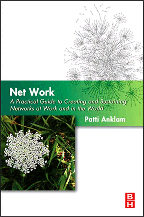Connectivity Trumps Productivity: The Online Social Life of Stowe Boyd
We went down to the Boston waterfront last week to check out the exhibits and see a few talks at Enterprise 2.0 (formerly called the collaborative technologies conference). We apparently missed some awesome keynotes, which are fortunately all available on the site. The exhibit space was very cramped and unpleasant, so we pretty much skipped it. But I did get to catch up with a few folks — Jessica Lipnack and Jeff Stamps, Geoff Bock, and Stowe Boyd.
I first met Stowe at a KMWorld in 1999, and have picked up on a number of his ideas and threads relating to social impact of collaboration tools and software over these past eight years. He continues to amaze in that while I participate in and try to use tools like LinkedIn and Facebook both to understand the technology and to stay connected with friends, colleagues, e-quaintances, and casual colleagues. Stowe is immersed in the technologies and is committed to living his life and displaying his connections, schedule, photos, thoughts, his entire (or so it seems) social milieu online using a collection of tools including blogs, Facebook, Dopplr, Twitter, and Flickr. Practicing what he preaches, Stowe is a passionate advocate for a world in which we truly value social capital.
It will happen, he said (or I am paraphrasing; I did not take notes), that having a larger number of connections is more important at work than simply doing a job well, or in his words, on a great slide show from his site titled Flow): “Productivity is second to Connectivity: network productivity trumps personal
productivity.” That is, the more connections you have the more resources you have to bring to a task: all work can be co-work.”
I’m co-opting a bit of this for my talk at the Boston KM Forum tomorrow. I’m talking about Net Work and leadership in knowledge management. My book and I already agree with Stowe that relationships are important. I also expect to make the points that the net work for KM leaders extends beyond the personal network of relationships needed to succeed. KM leaders need also to know how to help others build strong and purposeful networks within and across organizations and they need to build relational capability in the organization. Of course, one way to do that is to introduce these new tools of the social networked age. Here’s what I’m doing now.





1John
wrote on 25 June 2007 at 14:48
Patti, two books I’ve read recently touch on some of these thoughts, and may interest you and your readers-”x-Teams” by Deborah Ancona and Henrik Bresman talk about how to create high-functioning teams, and developing numerous, strong connections within and outside the company is a key. “Smart World” by Richard Ogle gets into some social network theory in describing how creative breakthroughs happen. I liked both books a lot and would be interested in your reaction. (I actually have an extra copy of “Smart World”-if you’re interested, email me your address and I’ll send it to you.)
Regards,
John
2RoasterBoy
wrote on 26 June 2007 at 4:58
A study in the early 90s sought to find out why some AT&T; engineers were more successful than others, even after education and experience were equalized. The study concluded that the successful engineers built their personal networks before they needed them. That way, not only did they know who knew what, but they’d already established trust and communications channels.
(I read a hardcopy version of the study about 10 years ago. If anyone could point me to an online version, I’d be most grateful.)
3Patti
wrote on 26 June 2007 at 14:07
Karl, I think the article you are referring to is Kelley, R. & Caplan, J., “How Bell Labs creates star performers” in Harvard Business Review (July-August 1993, HBSP). I only have hardcopy myself (and have had this same copy since the early 90s!). Thanks for reminding me about this piece of its content.
4Patti
wrote on 26 June 2007 at 14:10
John, I can’t email you because I can’t see who you are. Thanks for the link to Ancona. Her research in teams (again, stuff from the early 90s) reflects much of what we know today about the role of boundary crossers in organizational networks. I am not familiar with Ogle’s work.
5John
wrote on 27 June 2007 at 9:32
Hi, Patti, I had left the comment above. I wrongly assumed blogger would transmit my entire profile when I made my comment! I posted on my blog a reference to this post today as well. Hope all is well with you.
Regards,
John (Caddell)
6RoasterBoy
wrote on 28 June 2007 at 5:13
Thanks for the lead. I’d been searching for AT&T;, not Bell Labs. [Insert rant about how badly Google and other search engines handle non-alphanumerical characters.]
For $6.50, we can buy a PDF or hard copy version of the study: http://tinyurl.com/2zs6so. For an extra $4.50, you can get permission to make copies.
7Valdis Krebs
wrote on 4 July 2007 at 9:12
Of course, Ron Burt has been saying this for years as have other social network researchers. Arent Greve also did some reserach on this, looking at the importance of human capital and social capital. Most come to the conclusion that you get the best return on your human capital by maximizing your social capital. BTW, maximaizing your social capital is not just quantity… but, you know that.